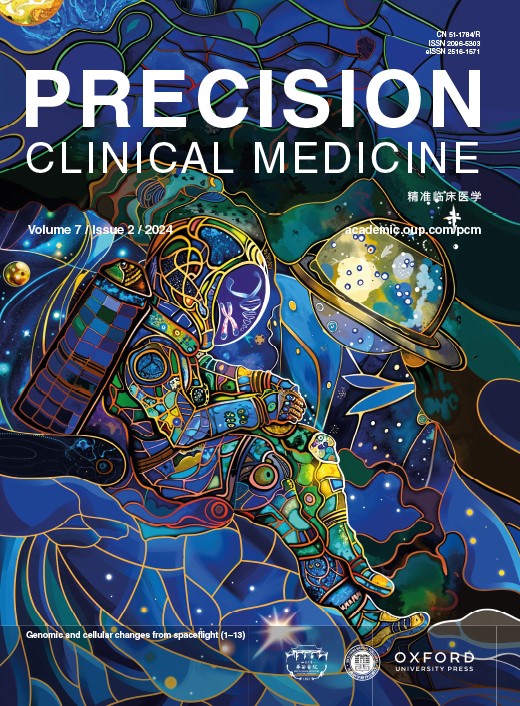染色体9p21缺失与胰腺腺鳞癌预后不良相关
IF 5
4区 医学
Q1 MEDICINE, RESEARCH & EXPERIMENTAL
引用次数: 0
摘要
摘要胰腺腺鳞癌(Adenosquamous carcinoma of pancreatic, ASCP)是一种少见的胰腺组织学亚型,预后差,转移率高。然而,对其基因组景观和预后生物标志物知之甚少。对48例ASCP标本和98例胰腺导管腺癌(PDAC)肿瘤标本进行测序,以探索基因组景观和预后生物标志物。9p21.3区域(包括CDKN2A、CDKN2B和MTAP)的纯合缺失(9p21缺失)在ASCP和PDAC中均有发生,且ASCP中9p21缺失的频率更高(12.5% vs. 2.0%, p = 0.022)。值得注意的是,9p21缺失与ASCP患者较差的无病生存期(DFS)显著相关(mDFS = 4.17 vs. 7.33个月,HR = 3.70, p = 0.009)。ASCP患者中最常见的基因改变是KRAS(96%)、TP53(81%)、CDKN2A(42%)、SMAD4(21%)、CDKN2B(13%)和FAT3(13%)。ACVR2A (6.25% vs. 0)、FANCA (6.25% vs. 0)、RBM10 (6.25% vs. 0)和SPTA1 (8.33% vs. 1.02%)在ASCP患者中的突变率显著高于PDAC患者。总之,我们全面描述了迄今为止最大的ASCP患者队列的基因组景观,并强调9p21缺失可能是ASCP的一个有希望的预后生物标志物,为ASCP的预后预测和新的治疗策略提供了分子基础。本文章由计算机程序翻译,如有差异,请以英文原文为准。
Loss of chromosome 9p21 is associated with a poor prognosis in adenosquamous carcinoma of the pancreas
Abstract Adenosquamous carcinoma of the pancreas (ASCP) is a rare histological subtype of pancreatic cancer with a poor prognosis and a high metastasis rate. However, little is known about its genomic landscape and prognostic biomarkers. Forty-eight ASCP specimens and 98 pancreatic ductal adenocarcinoma (PDAC) tumours pecimens were sequenced to explore the genomic landscape and prognostic biomarkers. The homozygous deletion of the 9p21.3 region (including CDKN2A, CDKN2B, and MTAP) (9p21 loss) occurred in both ASCP and PDAC, and a higher frequency of 9p21 loss was observed in ASCP (12.5% vs. 2.0%, p = 0.022). Notably, 9p21 loss was significantly associated with poor disease-free survival (DFS) in ASCP patients (mDFS = 4.17 vs. 7.33 months, HR = 3.70, p = 0.009). The most common gene alterations in patients with ASCP were KRAS (96%), TP53 (81%), CDKN2A (42%), SMAD4 (21%), CDKN2B (13%), and FAT3 (13%). The mutation rates of ACVR2A (6.25% vs. 0), FANCA (6.25% vs. 0), RBM10 (6.25% vs. 0), and SPTA1 (8.33% vs. 1.02%) were significantly higher in ASCP than in PDAC. In conclusion, we have comprehensively described the genomic landscape of the largest cohort of ASCP patients to date and highlight that 9p21 loss may be a promising prognostic biomarker for ASCP, which provides a molecular basis for prognosis prediction and new therapeutic strategies for ASCP.
求助全文
通过发布文献求助,成功后即可免费获取论文全文。
去求助
来源期刊

Precision Clinical Medicine
MEDICINE, RESEARCH & EXPERIMENTAL-
CiteScore
10.80
自引率
0.00%
发文量
26
审稿时长
5 weeks
期刊介绍:
Precision Clinical Medicine (PCM) is an international, peer-reviewed, open access journal that provides timely publication of original research articles, case reports, reviews, editorials, and perspectives across the spectrum of precision medicine. The journal's mission is to deliver new theories, methods, and evidence that enhance disease diagnosis, treatment, prevention, and prognosis, thereby establishing a vital communication platform for clinicians and researchers that has the potential to transform medical practice. PCM encompasses all facets of precision medicine, which involves personalized approaches to diagnosis, treatment, and prevention, tailored to individual patients or patient subgroups based on their unique genetic, phenotypic, or psychosocial profiles. The clinical conditions addressed by the journal include a wide range of areas such as cancer, infectious diseases, inherited diseases, complex diseases, and rare diseases.
 求助内容:
求助内容: 应助结果提醒方式:
应助结果提醒方式:


